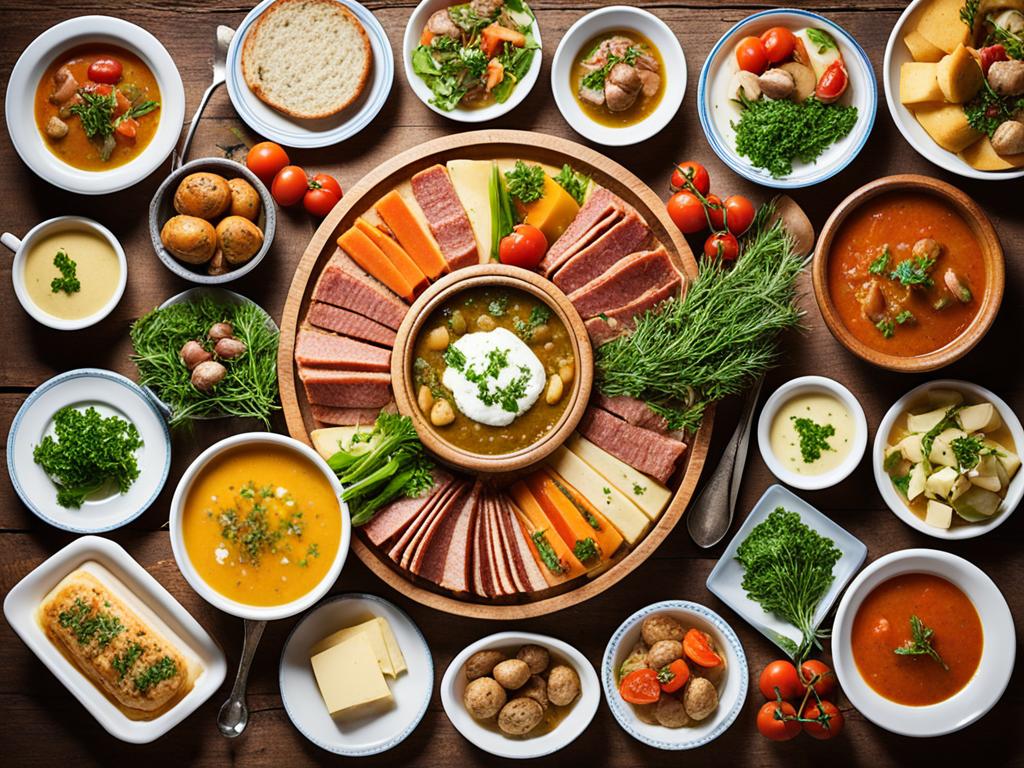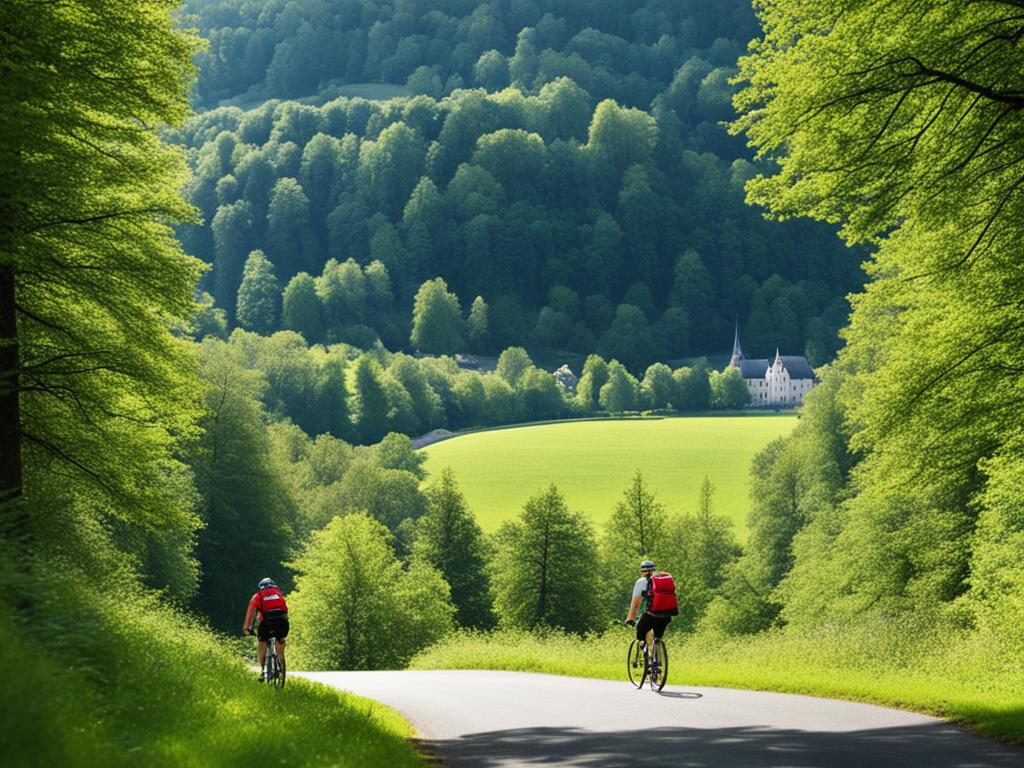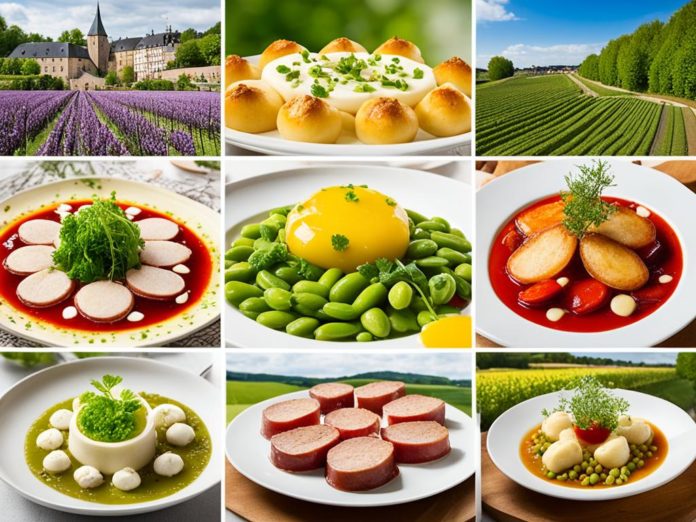Luxembourg is a small country in Western Europe with a big culture. It has a mix of people from many places, like Portugal, France, Italy, Belgium, and Germany. The main language is Luxembourgish, but many also speak French and German.
Most people in Luxembourg are Christian, making up over 70% of the population. The food here shows its location in Europe, mixing tastes from France, Belgium, and Germany. This makes the food special.
Key Takeaways
- Luxembourg has a diverse population with a blend of native Luxembourgers and significant immigrant communities.
- Luxembourgish is the official language, but French and German are also widely spoken.
- The country has a strong Catholic tradition, with over 70% of the population identifying as Christian.
- Luxembourg’s cuisine blends influences from neighboring countries, creating a unique culinary experience.
- The country’s culture is defined by its rich heritage, multilingual identity, and diverse religious affiliations.
Culture in Luxembourg: People, Foods, Traditions, Religion
National Identity and Ethnic Relations
Luxembourg’s culture is deeply rooted in its history of foreign rule. The native Luxembourgish people make up more than half of the population, which is about 401,000. Immigrants and their families make up the rest, mainly from Portugal, France, Italy, Belgium, and Germany. Early Italian immigrants blended in well, but recent Portuguese ones have found it harder to adjust. Still, Luxembourg keeps its society united despite its diverse groups.
Linguistic Affiliation and Symbolism
Language is key to the cultural identity of Luxembourgers. The country uses Luxembourgish, French, and German as official languages. Luxembourgish, a mix of French and local dialects, is spoken at home and with friends. But French is used for education, government, and serious business.
The motto “Mir wëlle bleiwe, war mir sin” (We want to remain what we are) shows Luxembourg’s wish to keep its culture. The flag and anthem are symbols of national pride and tradition.
| Key Statistic | Value |
|---|---|
| Over 95% of the population in Luxembourg identifies as Roman Catholic | 95% |
| Approximately 60% of Luxembourgers own their own homes | 60% |
| Women represent about one-third of the labor force in Luxembourg | 33% |
| Around two-thirds of the labor force is employed in service-related fields, with close to one-third working in industry, construction, and transportation in Luxembourg | 66% service, 33% industry/construction/transportation |
| About 5% of the labor force in Luxembourg is engaged in agriculture | 5% |
This motto shows Luxembourg’s effort to keep its culture unique. The flag and anthem are symbols of pride and tradition in the country.
Traditional Luxembourgish Cuisine
Luxembourg’s food shows its spot in central Europe, mixing tastes from France, Belgium, and Germany. Traditional dishes are simple, filling, and come from the country’s farming past. Favorites include Bouneschlupp (bean, potato, and bacon soup), Gromperekichelcher (potato fritters), Judd mat Gaardebounen (smoked pork collar with broad beans), and Rieslingspaschtéit (meat and pie made with Riesling wine).
Meats, Fish, and Dairy Products
Meat, especially pork and beef, is big in the Luxembourgish diet. The country makes more beef than it needs, with 114% of its demand met. It also produces 99% of its milk and 67% of its pork. You’ll find tasty sausages like Mettwurscht (spicy pork sausage) and Lëtzebuerger Grillwurscht (small, spicy pork sausages).
Even though Luxembourg doesn’t have a coast, its rivers offer fresh fish like trout, pike, and crayfish. These are often made into dishes like Fritür (small fried fish) and gebackene Fësch (deep-fried fish). Dairy, including cheese and butter, is also key in Luxembourgish food.
| Meat Products | Fish Dishes | Dairy Products |
|---|---|---|
| Mettwurscht (spicy pork sausage) | Fritür (small fried fish) | Kachkéis (soft cheese spread) |
| Lëtzebuerger Grillwurscht (small, spicy pork sausages) | gebackene Fësch (deep-fried fish) | Butter |
| Féierstengszalot (meat salad with calf’s head) | Trout, Pike, Crayfish | Various cheeses |
| Kuddelfleck (tripe with spicy tomato sauce) | ||
| Traïpen (fried blood sausage with applesauce) |

Literature, Arts, and Music
Luxembourg’s culture is rich, influenced by France, Belgium, and Germany. The country’s literature started in the 19th century. Authors like Edmond de la Fontaine and Batty Weber have made big impacts.
The visual arts in Luxembourg go way back to the Roman times. The early 20th century saw the rise of Impressionism and Expressionism. Now, Luxembourg’s art scene is diverse, with many styles and mediums.
The music scene in Luxembourg is lively, with fans of jazz, pop, and rock. The Echternach festival is famous for its traditional dancing. The Festival de Wiltz is another big event, with music and arts outdoors for thousands of people.
| Art Form | Notable Figures and Events |
|---|---|
| Literature | Edmond de la Fontaine, Batty Weber |
| Visual Arts | Impressionism, Expressionism, Abstract Art |
| Music | Jazz, Pop, Rock, Echternach Festival, Festival de Wiltz |
| Performing Arts | Echternach Festival, Festival de Wiltz |
Luxembourg’s culture shows its rich heritage and creative spirit. From famous writers to lively arts and music, Luxembourg’s culture keeps growing and inspiring people.
Sports and Outdoor Activities
Luxembourg may be small, but it’s big on sports and outdoor fun. Football, or luxembourg football, is the top sport here. The Luxembourg Football Federation runs the national teams and the league.
Luxembourg folks love many luxembourg outdoor activities. These include biking, hiking, adventure sports, climbing, golf, water sports, and horseback riding. The country’s varied landscapes offer great spots for these activities.
Cycling and Other Popular Sports
While luxembourg football is big, other sports like cycling, basketball, and handball are also popular. Luxembourgish cyclists have won big in international events.
The country’s beauty and good infrastructure make it perfect for outdoor lovers. Luxembourg sports fans can enjoy the scenic views, hike, or play golf on beautiful courses.

Whether you love football or adventure, Luxembourg has sports and outdoor fun for everyone. From the excitement of a football match to peaceful hikes, it’s a great place for sports and nature fans.
Family Life and Social Norms
Luxembourg values gender equality highly. Women and men have the same rights and chances. Many women over 65 support their adult kids financially when needed.
But, luxembourg family life has changed a lot in recent years. Now, almost one-third of couples choose to live together without getting married. Luxembourg divorce rates have gone up, showing a change in social norms.
Most families here prefer the nuclear family setup. Yet, sometimes, older grandparents live with their kids and grandkids. The country has great childcare support. This helps parents who work outside the home. Luxembourg gender equality policies push both moms and dads to work.
Even with these changes, Luxembourg has a low birth rate. Most families have one or two kids. The focus on work-life balance and childcare options helps with this.
“Luxembourg’s family life reflects a delicate balance between traditional values and modern societal shifts, as the country continues to evolve in its pursuit of gender equality and work-life harmony.”
Conclusion
Luxembourg’s culture is a mix of its European roots and diverse people. It may be small, but it has a lot to offer. From its food and language to its arts and music, there’s a lot to explore.
The Luxembourgish people hold onto their identity but welcome new cultures too. This mix helps everyone feel part of the community. It also brings new traditions and ideas into the mix.
Luxembourg keeps its old ways but also changes with the times. It values speaking many languages, showing it’s open to everyone. The country also respects different faiths, making it a place where many can feel at home.
Visitors and locals can enjoy Luxembourg’s unique culture in many ways. You can try traditional foods, dive into the arts, or enjoy outdoor activities. Luxembourg’s blend of old and new makes it a special place to visit.
As the country moves forward, it holds onto its heritage but also welcomes new ideas. This balance makes Luxembourg’s culture truly special in today’s world.
